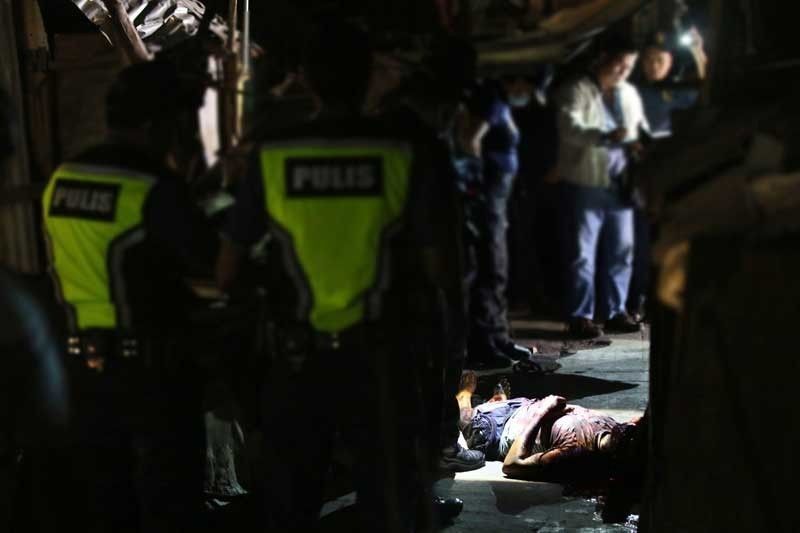PNP: Official death toll from drug war at 5,526

MANILA, Philippines — The number of deaths in the government’s war on drugs officially breached the 5,500-mark over the last three years – fewer by 1,174 than the figure released earlier by the Philippine National Police (PNP).
Data from the RealNumbersPH forum showed that the number of drug suspects killed in anti-narcotics operations reached 5,526 from July 1, 2016 to June 30 this year.
The number is notably lower than the report released last month by the PNP that at least 6,600 were slain in police anti-drug operations.
Government officials brushed off the discrepancies in the drug death toll, saying the lower figure is the official and validated data.
PNP deputy spokesperson Lt. Col. Kimberly Molitas said there was confusion with the data, citing validation that the Philippine Drug Enforcement Agency has to do to determine if the deaths were indeed related to illegal drugs.
The administration released the official tally of the drug killings as the United Nations Human Rights Council (UNHRC) adopted a resolution which seeks to probe the human rights situation in the country.
Asked if the administration will comply with the resolution, Undersecretary Severo Catura, executive director of the Presidential Human Rights Committee Secretariat, said the government stands by the position to “totally reject” it.
Catura described the resolution as “very divisive” that was perpetrated by “countries who tend to be bullies” toward developing countries.
Phl thanks US aid in drug war
The Philippines’ top diplomat thanked yesterday the United States for its assistance in the Duterte administration’s war on drugs, calling the US Department of Justice and Drug Enforcement Administration (USDEA) the most “effective” and “emphatic” of all anti-drug enforcers in the world.
“Thank you America. Of all anti-drug enforcers in the world the most effective and emphatic is the USDEA whose agents stopped dead cold the illegal drug trade’s infiltration of our armed forces during the time of former president Cory Aquino. It had made inroads during the corrupt Marcos regime,” Foreign Affairs Secretary Teodoro Locsin Jr. said on his Twitter account.
Reacting to Locsin’s tweet, Muntinlupa Rep. Ruffy Biazon said the success in the US anti-drug campaign is mainly due to evidence gathering through consensual recording, which the Philippines does not have.
On Tuesday, Assistant Secretary of State for East Asian and Pacific Affairs David Stilwell said the US remains committed to working with the Philippines to combat illegal drugs.
“We remain committed to working together on evidence-based approaches to reducing drug demand by improving prevention, treatment and rehabilitation services,” Stilwell said during the Eighth US-Philippines Bilateral Strategic Dialogue in Manila.
“I want to continue sharing information and best practices to jointly combat this common challenge in a manner that will respect human rights and the rule of law,” he added.
On July 12, the UNHRC adopted the Iceland-backed resolution calling for a review of the human rights situation in the Philippines.
Eighteen of 47 member-states supported the resolution which, among others, asked the rights body to prepare a comprehensive report on the drug killings in the Philippines.
Fourteen countries opposed it and 15 abstained.
Palace condemns boy’s slay
Meanwhile, Malacañang yesterday condemned the rape and killing of a one-year-old boy in Makati and vowed to bring the perpetrator to justice.
The victim’s body was found in an abandoned building along Yakal street in Barangay San Antonio on Wednesday, according to police.
Police arrested Gerald Reparip, a 28-year-old construction worker, who admitted to raping the boy and choking him to death.
The suspect said he was drunk when he committed the crime, but denied using drugs.
While probers have yet to determine whether Reparip was using drugs, presidential spokesman Salvador Panelo said the incident reflected the misdeeds of drug rings.
‘UN resolution can still be reversed’
Sen. Imee Marcos said the proposed review of the Philippine human rights situation at the UNHRC could still be reversed.
“There is no UN rule that stops UNHRC member-states from changing their original votes on the Iceland-backed resolution,” Marcos said.
She cited the case of Israel wherein American diplomats lobbied for its recognition of statehood in the UN.
“History shows it has been done before and involving a very profound issue. Israel is today a globally recognized state because of vote changes on a UN resolution legitimizing Israel’s statehood, thanks to lobbying by US diplomats in Israel’s favor,” Marcos said.
She said the Philippines’ top diplomat could demand foreign ambassadors based here to explain their country’s vote in favor of the UN resolution initiated by Iceland.
“From there, an amicable and mutually beneficial decision may be reached,” she said.
Marcos said the Philippines can also negotiate with European Union states that are non-members of the UNHRC to speak with EU members who voted.
She maintained that the country’s diplomatic ties with Iceland should be cut, saying “it has no reason to antagonize the Philippines.”
“Whatever political agenda Iceland has because of its floundering balance of trade, the resolution it sponsored to review allegations of human rights abuse in the Philippines is sheer hypocrisy,” Marcos said.
Sen. Leila de Lima said the rising deaths of children in the government’s war on drugs make it even more urgent for the UNHRC to conduct a probe on the killings.
De Lima also deplored Malacanang’s deliberate effort to downplay the number of drug-related killings.
She said the Presidential Communications Operations Office should not treat the deaths as mere numbers, but it must take into account that “these victims have families who are suffering from their demise.” –With Pia Lee Brago, Alexis Romero, Cecille Suerte Felipe
- Latest
- Trending


























